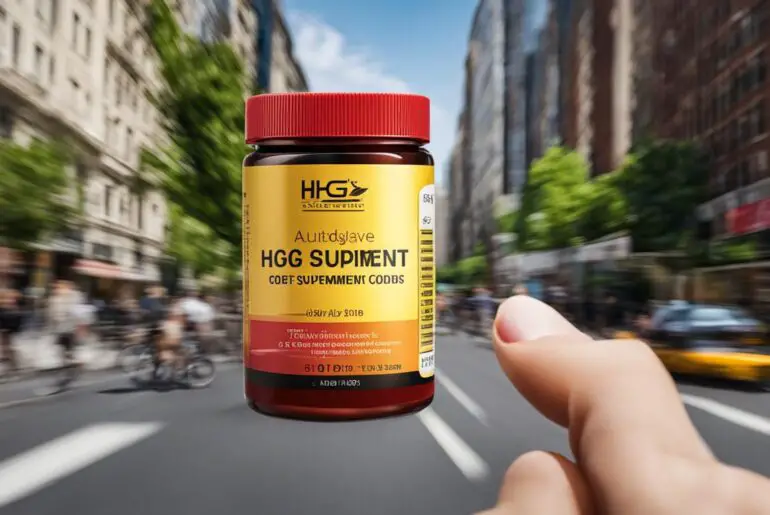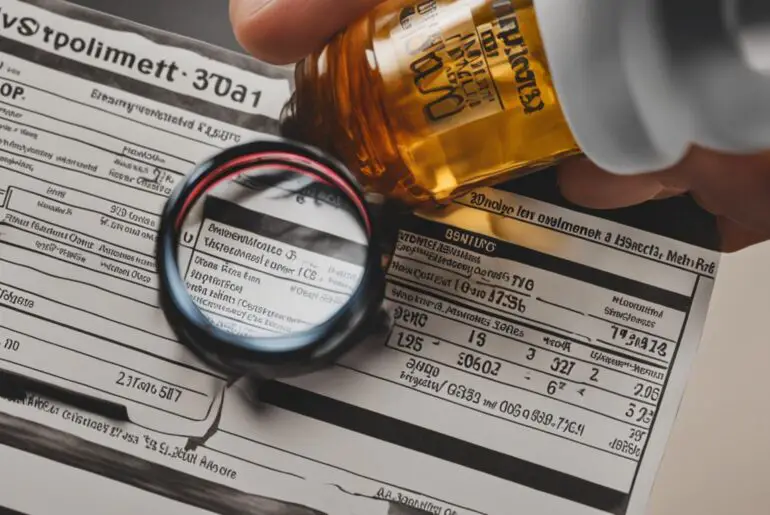Did you know that the HCG diet, a controversial weight loss method, involves taking the hormone HCG along with a very low-calorie diet? While it promises fast weight loss without hunger, the FDA considers it illegal and dangerous. HCG, or human chorionic gonadotropin, is a hormone produced in early pregnancy. It is used as a marker for pregnancy and has also been used to treat fertility issues.
The HCG diet consists of an ultra-low-calorie diet of around 500 calories per day and HCG hormone injections. However, studies have shown that the weight loss achieved on the HCG diet is due to the extreme calorie restriction, not the HCG hormone itself. There are also potential side effects and risks associated with the HCG diet, including decreased muscle mass, metabolic slowdown, and the potential for blood clots and other serious complications. Before starting the HCG diet, it is important to consult with a healthcare professional.
Key Takeaways:
- The HCG diet involves taking the HCG hormone along with a very low-calorie diet.
- The FDA considers the HCG diet illegal and dangerous.
- The weight loss achieved on the HCG diet is primarily due to extreme calorie restriction, not the HCG hormone.
- Potential side effects of the HCG diet include decreased muscle mass, metabolic slowdown, and the potential for blood clots and other complications.
- Before starting the HCG diet, it is important to consult with a healthcare professional.
The Science Behind the HCG Diet
The HCG diet is based on the theory that the HCG hormone can boost metabolism and help with weight loss. However, studies have shown that the weight loss achieved on the HCG diet is actually due to the extreme calorie restriction.
The HCG diet typically consists of three phases:
- The Loading Phase: During this phase, you eat high-fat, high-calorie foods for two days while taking HCG.
- The Weight Loss Phase: This phase involves continuing to take HCG and restricting your calorie intake to only 500 calories per day for three to six weeks.
- The Maintenance Phase: After the weight loss phase, you gradually increase your food intake but avoid sugar and starch for three weeks.
During the weight loss phase, meals on the HCG diet typically include a portion of lean protein, a vegetable, a piece of bread, and a serving of fruit. It is important to follow the HCG diet protocol carefully and consult with a healthcare professional before starting.
Safety and Side Effects of the HCG Diet
The HCG diet is not approved by the FDA as a weight loss aid and has been associated with various side effects. The diet involves severe calorie restriction, which can lead to fatigue, irritability, restlessness, depression, and fluid buildup. There have also been reports of blood clots and other serious complications. Additionally, the HCG diet may result in gallstone formation, irregular heartbeat, limited intake of vitamins and minerals, and an imbalance of electrolytes.
It is important to note that the HCG diet products available online are often labeled as homeopathic and do not contain actual HCG. These products are unregulated and potentially unsafe. If weight loss is your goal, there are safer and more effective methods available, such as eating a balanced diet and engaging in regular exercise. Consult with a healthcare professional before starting any weight loss program.
Scam Products on the Market
When it comes to the HCG diet, it is essential to be cautious and informed about the products available on the market. Unfortunately, many HCG products labeled as homeopathic do not contain actual HCG, making them ineffective or potentially harmful.
As a beginner exploring the HCG diet, it is crucial to understand that genuine HCG, in the form of injections, can only be obtained with a doctor’s prescription and is primarily used as a fertility drug or hormone treatment.
Therefore, it is vital to exercise caution when purchasing HCG products online and ensure you only source them from reputable suppliers. If necessary, seek guidance from a doctor to ensure you are making informed choices. Thorough research plays a vital role in avoiding scam products and protecting your well-being.
Reasons to Avoid Scam Products:
- They may not contain actual HCG, rendering them ineffective for achieving the desired results.
- Lack of regulation raises concerns about product quality, safety, and potential adverse effects on your health.
- Purchasing from unverified sources enhances the risk of exposure to counterfeit or fraudulent products.
Choosing Reputable Suppliers:
Ensuring the authenticity and safety of the HCG products you purchase is crucial for a successful and safe journey on the HCG diet. Here are some tips to help you find reputable suppliers:
- Consult with a healthcare professional, such as a doctor, dietitian, or nutritionist, who can provide guidance and recommend trusted sources for HCG products.
- Research and read reviews from reliable sources to identify reputable suppliers with a track record of quality products and customer satisfaction.
- Look for certifications or accreditations from recognized authorities that indicate the supplier follows strict quality standards.
Exercise Caution and Prioritize Your Safety
It is essential to prioritize your safety and well-being while embarking on the HCG diet journey. Avoid falling victim to scam products that may put your health at risk. Instead, make informed choices by following expert guidance, conducting thorough research, and purchasing HCG products from reputable sources verified by healthcare professionals.
Remember, your health and safety are paramount, and investing time and effort into choosing legitimate HCG products will contribute to a more effective and secure experience on the HCG diet.
The Bottom Line on the HCG Diet

The HCG diet may promise fast weight loss, but it is not a safe or sustainable method. Studies have shown that the weight loss achieved on the HCG diet is primarily due to the severe calorie restriction, not the HCG hormone itself. The diet carries potential risks and side effects, and there are safer and more effective ways to lose weight.
If you are considering the HCG diet, it is recommended to speak with a healthcare professional, such as a doctor, dietitian, or nutritionist, to determine a personalized and sustainable weight loss plan that is right for you. They can provide guidance on safe and effective diet and exercise strategies that promote long-term weight management and overall health.
Remember, sustainable weight loss requires a balanced approach that focuses on healthy eating, regular physical activity, and behavior changes. There is no magic pill or quick fix when it comes to weight loss. Taking the time to develop healthy habits and making lifestyle changes will lead to long-term success.
Choose a weight loss plan that is backed by scientific evidence and has been proven to be safe and effective. Take care of your health and make informed decisions that support your overall well-being.
| Pros | Cons |
|---|---|
| – May result in rapid weight loss | – Severe calorie restriction can lead to fatigue, irritability, and other side effects |
| – Temporary changes in eating habits may help kick-start healthier habits | – Not a sustainable or long-term weight loss solution |
| – Can provide motivation and a sense of control over food | – Potential risks and complications associated with the HCG hormone and extreme calorie restriction |
| – May offer support and accountability through structured diet plan | – Lack of scientific evidence supporting the effectiveness of HCG hormone for weight loss |
Ultimately, it is important to prioritize your health and well-being above all else. Seek guidance from trusted healthcare professionals to create a personalized weight loss plan that aligns with your goals and supports your long-term health.
Phase 1 of the HCG Diet: Loading Phase
The HCG diet begins with a crucial phase known as the loading phase. During this phase, you are advised to consume high-fat, high-calorie foods for two days while taking HCG. This initial step is considered essential in preparing your body for the subsequent low-calorie phase.
In the loading phase, the objective is to eat heartily and indulge in fatty and oily foods as much as possible. This phase helps to kickstart your metabolism and stores extra energy reserves for the next phase of the diet.
To successfully navigate the loading phase, it is crucial to follow the given instructions diligently. These guidelines will ensure that you are on the right track towards achieving your weight loss goals. For personalized guidance and optimal results, consulting with a healthcare professional is highly recommended.
Phase 2 of the HCG Diet: Weight Loss Phase

After completing the loading phase, it’s time to transition into the weight loss phase of the HCG diet. During this phase, you continue taking HCG and significantly restrict your calorie intake to only 500 calories per day for a period of three to six weeks. This phase is crucial for achieving the desired weight loss goals.
The HCG diet protocol outlines specific guidelines for this phase. It recommends meals that consist of lean protein, vegetables, fruit, and a small serving of bread. By following these dietary instructions, your body will be able to sustain itself on the reduced calorie intake while still receiving the necessary nutrients.
It’s important to note that this phase requires strict adherence to the HCG diet protocol. This means closely monitoring your calorie intake and ensuring that you’re consuming the recommended foods. Deviating from the prescribed guidelines may affect the effectiveness of the diet and hinder your weight loss progress.
Consultation with a healthcare professional is crucial during the weight loss phase. They can provide personalized guidance and monitor your progress to ensure your safety and well-being throughout the process.
It’s also important to be aware of potential side effects and risks associated with extreme calorie restriction. The HCG diet, particularly during the weight loss phase, may lead to fatigue, irritability, dizziness, and other symptoms. Monitoring your body’s response and consulting with a healthcare professional will help you navigate these potential challenges effectively.
Sample Meal Plan for the Weight Loss Phase
Here’s a sample meal plan that aligns with the HCG diet protocol for the weight loss phase:
| Meal | Food Choices |
|---|---|
| Breakfast | A serving of lean protein (such as chicken breast or white fish) |
| A side of vegetables (such as spinach or asparagus) | |
| A small piece of bread or melba toast | |
| A serving of fruit (such as an apple or half a grapefruit) | |
| Lunch | A serving of lean protein (such as lean beef or shrimp) |
| A side of vegetables (such as broccoli or cabbage) | |
| A small piece of bread or melba toast | |
| A serving of fruit (such as strawberries or oranges) | |
| Dinner | A serving of lean protein (such as turkey or white fish) |
| A side of vegetables (such as zucchini or cauliflower) | |
| A small piece of bread or melba toast | |
| A serving of fruit (such as blueberries or raspberries) |
Remember to stay hydrated by drinking plenty of water throughout the day. Water can help reduce feelings of hunger and keep you feeling fuller for longer.
By following the HCG diet protocol closely during the weight loss phase and seeking guidance from a healthcare professional, you can maximize your chances of achieving your weight loss goals safely and effectively.
Phase 3 and Beyond: Maintenance and Long-Term Strategy
After completing the weight loss phase of the HCG diet, it’s time to focus on maintenance and establishing long-term healthy habits. Phase 3 is a crucial part of the diet, where you gradually increase your food intake while still being mindful of your choices to avoid sugar and starch for three weeks.
This maintenance phase is essential for stabilizing your weight and preventing rebound weight gain. It allows your body to adjust to a higher calorie intake while still benefiting from the healthy eating habits you’ve developed during the weight loss phase. By avoiding sugar and starch, you can maintain stable blood sugar levels and avoid triggering cravings and overeating.
Once you have successfully completed the maintenance phase, it’s important to develop a long-term strategy for maintaining your weight loss and overall health. This involves incorporating regular exercise into your routine, following a balanced diet, and seeking ongoing guidance from healthcare professionals or a registered dietitian.
Regular exercise is crucial for maintaining weight loss and improving overall health. It helps increase your metabolism, build lean muscle mass, and burn calories. Aim for a combination of cardiovascular exercise, such as running or swimming, and strength training exercises to tone and strengthen your muscles.
In addition to exercise, following a balanced diet is key to long-term success. Focus on consuming a variety of nutrient-dense foods, including fruits, vegetables, whole grains, lean proteins, and healthy fats. Limit processed foods, sugary snacks, and high-fat foods.
Seeking ongoing guidance from healthcare professionals or a registered dietitian can provide you with personalized advice and support. They can help you create a tailored meal plan, monitor your progress, and address any challenges or concerns you may have along the way.
Tips for Successful Long-Term Weight Maintenance:
- Set realistic goals and create a sustainable plan that fits your lifestyle.
- Stay consistent with your exercise routine and make it a priority.
- Listen to your body’s hunger and fullness cues to avoid overeating.
- Keep track of your progress and celebrate your achievements along the way.
- Find healthy, enjoyable alternatives to your favorite indulgent foods.
- Establish a support system to keep you motivated and accountable.
Remember, the HCG diet is just one approach to weight loss, and it may not be suitable or safe for everyone. It’s important to prioritize your overall health and well-being when considering any weight loss method. Consult with a healthcare professional or registered dietitian to determine the best approach for your individual needs and goals.
| Benefits of Maintenance Phase | Tips for Long-Term Success |
|---|---|
| Stabilizes weight | Set realistic goals |
| Establishes healthy eating habits | Stay consistent with exercise |
| Avoids rebound weight gain | Listen to your body’s cues |
| Maintains stable blood sugar levels | Track progress and celebrate achievements |
| Avoids triggering cravings | Find healthy alternatives |
Conclusion
After careful examination, it is clear that the HCG diet is not a safe or sustainable method for weight loss. The FDA has deemed it illegal and dangerous, and studies have shown that the extreme calorie restriction is the primary factor behind the weight loss, not the HCG hormone itself. This diet carries potential risks and side effects, and there are better alternatives available.
If you are looking to achieve and maintain weight loss, I strongly recommend consulting with a healthcare professional. They can guide you in developing a personalized weight loss plan that focuses on your overall health and well-being. There are plenty of safe and effective methods for achieving your weight loss goals, so it is essential to choose a strategy that is right for you.
Remember, sustainable weight loss is not about quick fixes or extreme measures. It is about making long-term lifestyle changes that promote a healthy body and mind. By incorporating balanced nutrition, regular physical activity, and professional guidance, you can achieve lasting results without jeopardizing your well-being. Take the time to invest in your health and choose a weight loss approach that is safe and sustainable.
FAQ
How do I start the HCG diet with supplements?
To start the HCG diet with supplements, it is important to first consult with a healthcare professional. They can provide guidance on whether the HCG diet is suitable for you and help you determine the appropriate dosage and duration for taking the supplements. It is also essential to purchase HCG supplements from reputable sources and follow the recommended dosage instructions.
What are HCG diet supplements?
HCG diet supplements are products that claim to contain HCG hormone and are used in conjunction with a very low-calorie diet for weight loss. However, it is important to note that these supplements may not actually contain real HCG and are often labeled as homeopathic. Genuine HCG, in the form of injections, can only be obtained with a doctor’s prescription and is used as a fertility drug or hormone treatment.
How do I start the HCG diet?
Before starting the HCG diet, it is crucial to consult with a healthcare professional. They can provide personalized guidance and help develop a plan that fits your specific needs and goals. The diet typically involves three phases: the loading phase, the weight loss phase, and the maintenance phase. Each phase has specific guidelines and involves specific food choices and calorie restrictions.
What is the HCG diet protocol?
The HCG diet protocol is a specific set of guidelines and recommendations that must be followed while on the HCG diet. It outlines the duration, dosage, and timing of HCG supplementation, as well as the recommended calorie intake and food choices during each phase of the diet. It is crucial to follow the protocol carefully to achieve the desired results and minimize potential risks.
What is Phase 1 of the HCG diet?
Phase 1 of the HCG diet, also known as the loading phase, involves consuming high-fat, high-calorie foods for two days while taking HCG supplements. The purpose of this phase is to prepare the body for the low-calorie phase to come. It is essential to follow the loading phase instructions carefully and consult with a healthcare professional for personalized guidance.
What is Phase 2 of the HCG diet?
Phase 2 of the HCG diet, also known as the weight loss phase, is when you continue taking HCG supplements and restrict your calorie intake to only 500 calories per day for three to six weeks. Meals during this phase typically include a portion of lean protein, a vegetable, a piece of bread, and a serving of fruit. It is crucial to follow the HCG diet protocol closely during this phase and consult with a healthcare professional for guidance.
What is Phase 3 of the HCG diet?
Phase 3 of the HCG diet is the maintenance phase, where you gradually increase your food intake but avoid sugar and starch for three weeks. This phase helps stabilize your weight and establish healthy eating habits. Beyond Phase 3, it is essential to develop a long-term strategy for maintaining your weight loss and overall health. This may involve incorporating regular exercise, following a balanced diet, and seeking ongoing guidance from healthcare professionals.
What are the safety and side effects of the HCG diet?
The HCG diet is considered controversial and potentially unsafe. It involves severe calorie restriction, which can lead to fatigue, irritability, restlessness, depression, and fluid buildup. Other potential side effects and risks include decreased muscle mass, metabolic slowdown, and the potential for blood clots and other serious complications. It is important to consult with a healthcare professional before starting the HCG diet and to monitor your health closely during the diet.
Are there scam products on the market for the HCG diet?
Yes, there are scam products on the market for the HCG diet. Many products labeled as homeopathic HCG do not actually contain real HCG and are unregulated. It is important to be cautious and only purchase HCG products from reputable sources, with a doctor’s guidance if necessary. Doing thorough research and being aware of potential scams can help ensure your safety and the effectiveness of the products you choose to use.
Is the HCG diet a safe and sustainable method for weight loss?
The HCG diet is not considered a safe or sustainable method for weight loss. The FDA considers it illegal and dangerous, and studies have shown that the weight loss achieved on the diet is primarily due to the extreme calorie restriction rather than the HCG hormone itself. There are safer and more effective methods for achieving and maintaining weight loss, such as eating a balanced diet and engaging in regular exercise. It is recommended to consult with a healthcare professional to develop a personalized weight loss plan that promotes overall health and well-being.




